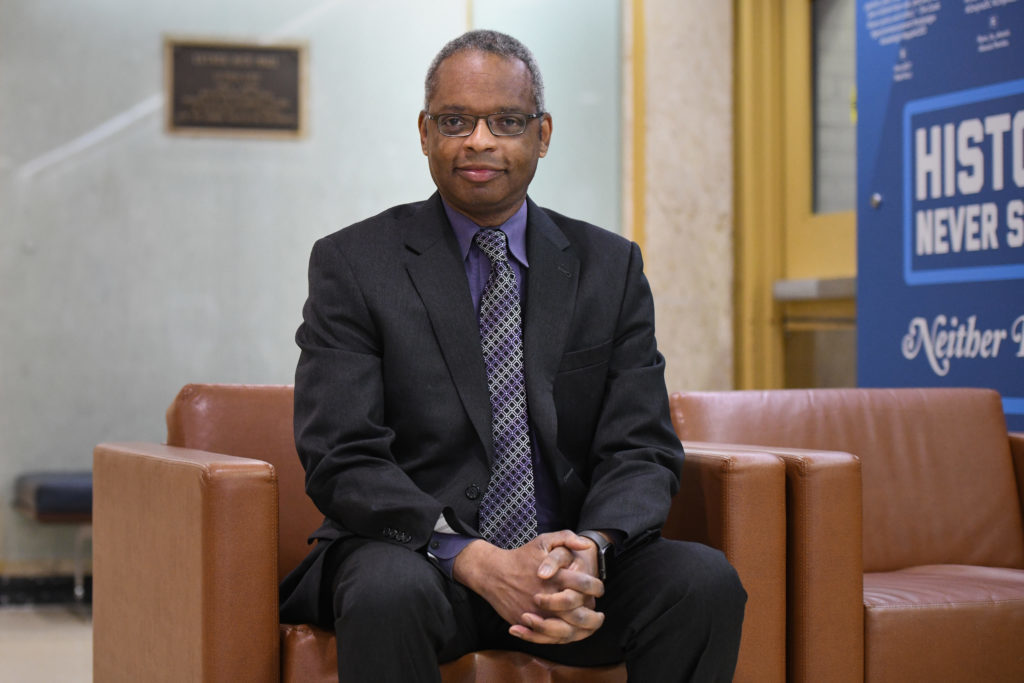Updated: Feb. 5, 2018 at 9:41 a.m.
Three months after assuming the role, the new director of community relations is looking to improve the rapport between GW and neighboring residents.
Kevin Michael Days, who was announced as community relations director in November, said his primary goal is to strengthen University-community ties by promoting campus events and resources – like research tools and community events – to local residents.
Days said showing the community opportunities available at GW will benefit both neighbors and students at a university that has had a historically tumultuous relationship with its surrounding neighborhood.
“The community is a rich resource of individuals,” he said. “There is a lot untapped opportunity there to have relationships both authentic and positive.”
Days said he wants to grow the University’s outreach to the community by promoting resources – like research tools in Gelman Library, which is open to members of several neighborhood organizations, speakers at Lisner Auditorium and campus sporting events – to community members.
“Having a university in the middle of your community, in the middle of your neighborhood, gives you access to all kinds of resources you wouldn’t get if you lived somewhere else,” Days said.
He has worked for 20 years in several District nonprofit organizations, including Serve D.C., Corporation for National and Community Service, Achieve, Inc. and Sustainable Futures Public Charter School, according to a University release in November. Days also serves on the Board of Directors for the National Youth Leadership Council.
GW’s urban campus provides a mutually beneficial relationship for Foggy Bottom residents and students because community members can benefit from the studies occurring at the University and the energy from the students, he said.
“By living in a community with young people, you are introduced to all kinds of themes and trends you would not know of,” he said.
But the relationship between neighbors and the University has been tense in the past as residents have often resisted University expansions and complained about excessive noise from students living off campus.
“The way that that gets minimized is through solid open communication, understanding what the concerns are from community members and then responding to those to indicate that you’ve heard what they’ve said and you are going to adjust,” he said.
Despite a rocky past, Days said student-community relations improved because of work by previous director Britany Waddell – who helped formalize off-campus housing complaints by standardizing consequences for violations.
Community leaders credited former University President Steven Knapp with patching up the relationship between the neighborhood and GW through actions like moving into the F Street House and implementing a community response program for neighbors’ complaints.
Days said he has not yet begun planning new programs or neighborhood policies, preferring to spend the opening months of his tenure meeting with neighborhood organizations and establishing himself as the “face” of GW in the community. He said he has been meeting with leaders of the Foggy Bottom and West End Neighborhood Advisory Neighborhood Commission and Foggy Bottom Association.
Days said community outreach can also be a part of the University-wide drive to improve the undergraduate student experience because building connections in the neighborhood can make students feel like a part of a wider community beyond campus.
“You’re going to spend most of your life in communities and you’re going to spend most of your life working and dealing with people who are not like you,” he said. “This is a wonderful opportunity to get training on that.”
University President Thomas LeBlanc has frequently discussed student satisfaction in the opening months of his tenure, saying students too often have a “transactional” relationship with the University. The Board of Trustees has formed a task force to examine the issue.
Days said the start of LeBlanc’s presidency is an ideal time to launch new community projects that will improve the student experience.
Foggy Bottom Association President Marina Streznewski said Days has already been helpful and responsive to her requests, including allowing the Foggy Bottom Homelessness Task Force to meet in various GW buildings.
“I made it really clear that I was hoping that we could take the improved relationship and make it even better,” she said. “Having the relationship between students and the University administration is so valuable to the community.”
In meetings earlier this year, they discussed areas where community and University goals overlap, including resources that would be needed to potentially resurrect the Foggy Bottom block party, which was scrapped last year after a 14-year-run, brainstorming new trash programs in the area and bridging relationships between residents and students, Streznewski said.
“I was mostly concerned about not losing the rapport, not losing the contacts that made it possible for us to get help with particular problems,” she said. “We are interdependent, even with students on campus.”





